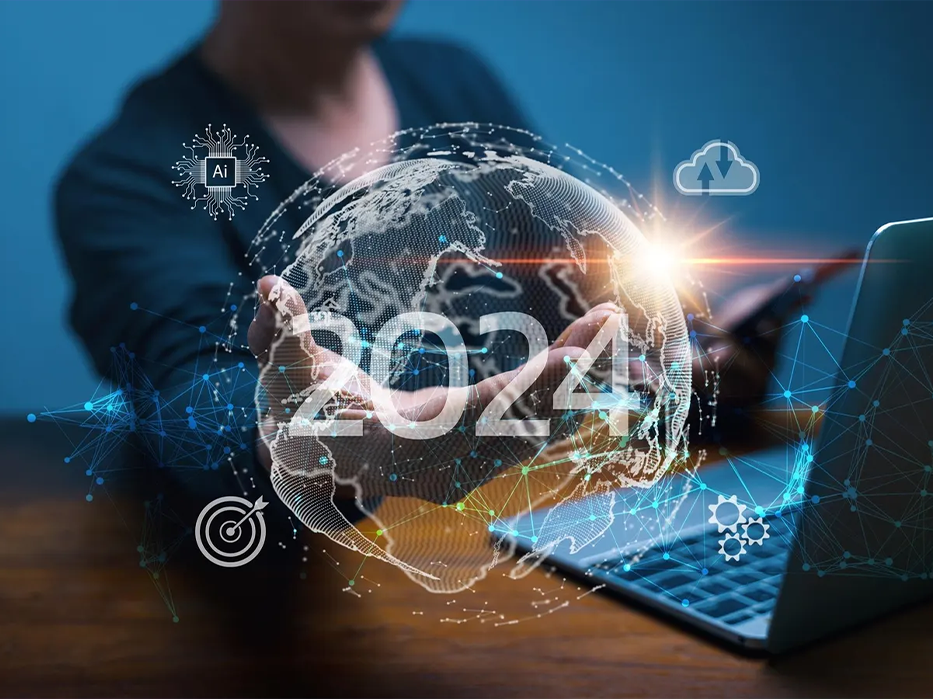1. Advancements in Artificial Intelligence (AI)
Artificial Intelligence continues to be at the forefront of technological advancements, influencing various sectors and reshaping how businesses operate and interact with customers:
- AI in Healthcare: AI-powered diagnostics, predictive analytics, and personalized treatment plans are transforming healthcare delivery. Machine learning algorithms are being used to analyze medical imaging, genomics data, and patient records to assist doctors in making more accurate diagnoses and recommending tailored treatment options.
- Natural Language Processing (NLP): Language models like GPT (Generative Pre-trained Transformer) have reached new heights in understanding and generating human-like text. This has led to improvements in chatbots, virtual assistants, and automated customer support systems, enhancing user experience and operational efficiency across industries.
- AI Ethics: With the increasing adoption of AI, there is a heightened focus on ethical considerations such as fairness, transparency, and accountability in AI algorithms. Efforts are underway to mitigate biases in AI systems and ensure that they operate in ways that align with societal values and principles.
2. Cybersecurity Innovations
As cyber threats grow in sophistication and frequency, cybersecurity remains a critical area of focus for organizations worldwide:
- Zero Trust Architecture: Traditional perimeter-based security approaches are being replaced by Zero Trust Architecture, which assumes that threats may exist inside and outside the network. This model emphasizes strict identity verification and access controls, limiting potential attack surfaces and enhancing overall security posture.
- AI-driven Security: AI and machine learning are being leveraged to detect and respond to cyber threats in real-time. These technologies enable automated threat detection, behavioral analysis to identify anomalous activities, and proactive incident response, thereby strengthening defenses against evolving cyber threats.
- Quantum Cryptography: With the advent of quantum computing, there is a growing need for quantum-resistant cryptography. Research and development efforts are focused on developing encryption algorithms and protocols that can withstand the computational power of quantum computers, ensuring the security of sensitive data in the future.
3. Blockchain and Cryptocurrency Developments
Blockchain technology continues to expand beyond its initial application in cryptocurrencies like Bitcoin:
- Blockchain in Supply Chain: Blockchain’s immutable and transparent ledger is being adopted for supply chain management to enhance traceability, reduce fraud, and improve operational efficiency. Companies are using blockchain to track the provenance of goods, streamline logistics, and ensure compliance with regulatory standards.
- Central Bank Digital Currencies (CBDCs): Several countries are exploring the issuance of CBDCs as digital versions of their national currencies. CBDCs aim to modernize payment systems, reduce transaction costs, and enhance financial inclusion by providing secure and efficient digital payment options to citizens and businesses.
- DeFi (Decentralized Finance): DeFi continues to innovate within the blockchain ecosystem, offering decentralized alternatives to traditional financial services such as lending, borrowing, trading, and asset management. DeFi platforms leverage smart contracts to automate transactions and eliminate intermediaries, providing users with greater financial autonomy and access to global markets.
4. Quantum Computing Progress
Quantum computing represents a paradigm shift in computational power and capability, albeit still in the early stages of development:
- Quantum Supremacy: Significant strides have been made in demonstrating quantum supremacy, where quantum computers outperform classical computers in executing specific tasks. These milestones highlight the potential of quantum computing to solve complex problems that are beyond the reach of traditional computing systems.
- Commercialization Efforts: Tech giants and startups are actively working to make quantum computing accessible through cloud-based services and APIs. Commercialization efforts aim to democratize access to quantum computing resources, enabling researchers, developers, and enterprises to explore and harness the transformative potential of quantum technology.
5. 5G and Edge Computing
The deployment of 5G networks and advancements in edge computing are driving innovation in connectivity and real-time data processing:
- 5G Rollouts: 5G networks offer significantly faster speeds, lower latency, and greater capacity compared to previous generations. This enables seamless connectivity for IoT devices, supports bandwidth-intensive applications like augmented reality (AR) and virtual reality (VR), and facilitates the development of smart cities and autonomous vehicles.
- Edge AI: Edge computing brings computational power closer to the data source, reducing latency and enabling real-time data processing and analysis. AI-powered edge devices and sensors can perform complex computations locally, improving response times for critical applications such as autonomous systems, industrial automation, and healthcare monitoring.
6. Augmented Reality (AR) and Virtual Reality (VR)
AR and VR technologies are evolving beyond entertainment and gaming, finding applications across diverse industries:
- AR in Retail and Education: Retailers are using AR for virtual try-ons, interactive product demonstrations, and personalized shopping experiences. In education, AR enhances learning through immersive simulations, virtual field trips, and interactive educational content.
- VR for Collaboration: VR technologies are transforming how teams collaborate and communicate remotely. Virtual meeting spaces, virtual offices, and immersive training environments enable distributed teams to work together effectively, fostering productivity and innovation.
7. Green IT and Sustainability
There is a growing emphasis on sustainability in IT practices and technologies, driven by environmental concerns and regulatory pressures:
- Energy-efficient Data Centers: Data centers are adopting energy-efficient technologies such as advanced cooling systems, renewable energy sources, and optimized hardware designs to reduce carbon footprints and minimize energy consumption.
- Circular Economy Initiatives: IT companies are focusing on sustainable practices such as e-waste recycling, refurbishment, and responsible disposal of electronic devices. Circular economy principles aim to extend the lifecycle of IT products, minimize waste generation, and promote resource conservation.
Conclusion
The IT developments of 2024 underscore the rapid pace of technological innovation and its profound impact on various aspects of society, economy, and daily life. From AI advancements and cybersecurity innovations to blockchain applications, quantum computing, and sustainable IT practices, these developments are shaping the future of technology and driving digital transformation across industries. Staying informed and adaptable to these emerging trends will be crucial for businesses, organizations, and individuals looking to harness the full potential of technology in the years ahead.





